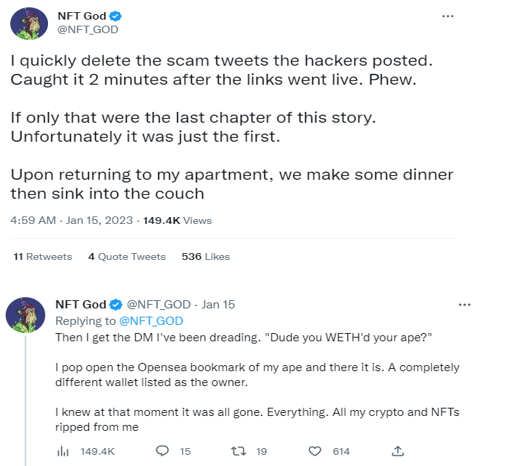
An NFT influencer has claimed to have lost a huge amount of their net worth in crypto and NFTs (Non-Fungible Tokens) after accidentally downloading malware found via a Google Ad search result.
The pseudo-anonymous influencer going by the name “NFT God” on Twitter described how his “entire digital livelihood” was attacked in a series of tweets on January 14. The influencer’s crypto wallet and multiple online accounts were also compromised.

NFT God, also known as “Alex,” added that he used the Google search engine to download an open-source video streaming software known as OBS. However, instead of clicking the official website, he clicked the sponsored advertisement thinking it was the same thing.
Hours later, the attackers posted a series of tweets on two Twitter accounts operated by Alex. That is when the NFT influencer realized that malware was downloaded from the software advertisement alongside the wanted software.
After a message from an acquaintance, Alex realized that his crypto wallet had also been compromised. The attackers breached his Substack account the next day and sent out phishing emails to all his 16,000 subscribers.

Blockchain data reveals that at least 19 Ether worth about $27,000 at that time, a Mutant Ape Yacht Club (MAYC) NFT with a current floor price of 14.95 ETH (about $25,000), and many other NFTs were stolen from Alex’s account.
Most of the ETH was moved through multiple crypto wallets before it was sent to FixedFloat, a decentralized exchange (DEX), where it was swapped for other cryptocurrencies.
According to Alex, the “critical mistake” that left his wallet vulnerable to an attack was setting up his hardware wallet as a hot wallet by entering its seed phrase “in a way that no longer kept it cold,” or offline, allowing the attackers to gain control over his NFTs and crypto.
However, this is not the first time that the crypto community is dealing with an attack involving malware spread through Google Ads.
On January 12, a report released by Cyble, a cybersecurity firm, warned of an information-stealing malware named “Rhadamanthys Stealer” that was spreading through Google Ads on “highly convincing phishing webpage(s).”
In October, Changpeng Zhao, the Binance CEO, warned that Google search results were being used to promote crypto phishing and scamming websites.
Although Google is yet to comment on the matter, its help center states that it “actively works with trusted advertisers and partners to help prevent malware in ads.”
Google also describes the use of “proprietary technology and malware detection tools” to scan Google Ads.
Buy and Sell NFTs for a Profit
You can grow your crypto earnings by buying cheap NFTs and selling them for a profit. NFTCrypto.io has made this even easier for you via their NFT trading signal system. They find profitable flips in the NFT market and share the signal with you in real-time. Join NFT Signals now and become a successful NFT trader. The platform users have so far earned a total group profit of over $800M.
